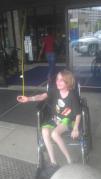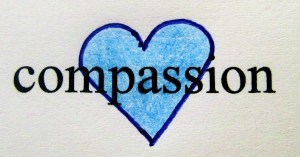When you hear the words rare disease there are certain things that you probably think of immediately:
- Hospital Stays
- Doctor Visits
- Medicines
- Scary
And you are right to think about all those thing,s but there is so much more that goes along with having a rare disease. My son has a rare disease called Langerhans Cell Histiocytosis. LCH is a cancer-like disease that tricks the white blood cells into thinking you are sick so they attack.
In my son’s case, they attacked his hip bone, eating it away. He had a bone graft of his hip (so yeah, a fake hip), spent months in a wheel chair and a year and a half in physical therapy. He still deals with chronic pain. Histio can also attack your skin, several bones or your organs but Joey has been lucky on that end. So yes, lots of doctors, hospitals, medicines and scariness. AND
1. Job Stability– It’s hard to maintain a full-time job when you need to care for a sick child. Luckily I had a lot of sick time built up and qualified for FMLA. Co-workers were also allowed to donate sick time to me. I was off almost three months. I would have lost my home if it wasn’t for paid sick leave. Not everyone has that luxury.
One mother I met in an online support group quit her job in order to start her business. That might sound like a dream to some people, but she had to give up a higher pay and good insurance in order to have the flexibility to care for her child and get her to doctor appointments.
2. Medical Bills– As a parent of a child with a rare disease, I can tell you we meet our $6000 deductible by spring EVERY year. Joey continues to have MRI’s, Pet Scans, x-rays and blood work on a regular basis. We are lucky though that we only pay a $6000 deductible. It definitely means putting things off or skipping things all together. I had planned to finally fix my teeth by getting braces but that won’t happen because the money needed to go to Joey’s bills. Paying for my daughter’s select soccer and other activities is always a balancing act. I don’t want her to miss out because her brother is sick.
Giving up braces and having to do creative financing is nothing though compared to what some families have gone through. One of the families in my Histio support group lost their house due to the extensive medical bills. They have a $6000 electric bill because they have to run clean air purifiers through the house nonstop.
3. The constant worry– Whether Joey has a simple headache or a leg cramp I immediately wonder if the Histio is eating another bone away. And although he won’t admit it anymore, I know he does too. There isn’t a day that goes by that we don’t wonder if it will come back. If it does… he will need chemo.
4. Post Traumatic Stress Disorder– My son, along with several other Histio and other rare disease patients, suffers from PTSD. It is getting better for Joey though thanks to counseling and other tools. The crying has stopped. The worry is becoming less and less.
A friend from the Histio support group has also dealt with this with her daughter. She was diagnosed at seven years old and is now 18. She has severe anxiety for days prior to a doctor’s appointment and even for a day or two after. She constantly worries about what might be discovered or what might happen while she is there.
5. Over Protective– People have told me that I shelter and baby Joey too much. Several of my Histio family parents have also told me that people make the same comments to them about their child with Histio. We all agree that we don’t give a flip what people think because we are just so grateful our children are alive.
6. Siblings and Children– As a parent of two children, with one having a rare disease, I always fear that my healthy child is not getting the attention that she needs. Andi is scared and worries about her brother. She’s also a typical 14-year-old girl who needs to do teenage girl stuff and get attention from her parents.
There are adults with Histio and other rare diseases. They constantly worry about how it is impacting their children. Instead of spending time with their children playing at the park and going to the movies, they are dragging the kids to their doctor’s appointments.
7. What Others Think– Joey can’t have pain without us worrying at least a little. Friends and family will say things like “I’m sure he’s fine” or “do you think he’s faking?” In March of 2012, I had no idea why my son was in so much pain. People, even doctors, thought he was faking. People thought I was crazy for taking him to so many doctors and insisting on so many tests. They repeatedly told me it was growing pains.
It wasn’t growing pains, he wasn’t faking, and I wasn’t crazy. His hip bone was gone. I’ve talked with other Histio families and who tell me their friends and family often accuse them of overacting. One thing we have learned through all of this is to trust our guts and to know we would rather overreact than have our child lose a bone or an organ.
8. Immune System– People with rare diseases often have compromised immune systems. Joey catches everything and it’s much worse for him than if Andi or I catch it. All three of us can catch the flu. Andi and I will be over it in five days. Fourteen days later, Joey will still have a fever of 103. And this was before he was ever diagnosed. Now I spend time begging my friends and family to get flu shots in hopes he won’t be exposed. Many children with rare diseases are now homeschooled because they can’t be exposed to the germs at school.
“My son underwent three years of chemotherapy beginning at four months,” said one from my Histio support group. ”He relapsed twice and required six different treatments before going into remission. We chose to quarantine him his final year. This meant my son, myself and my younger daughter. I went stir crazy and required antidepressants. My daughter wasn’t socialized, and I believe she still suffers effects.”
9. The Stares– People constantly stared at Joey when he was in a wheelchair. Most kids with Histio go through chemo and lose their hair. It’s amazing the comments and questions, children and adults, will say and ask.
One mother from my Histio support group told me that her son’s biopsy site on his scalp looked like a gross green plague. ”But the looks and comments from people were often more than I could handle,” she said “He was only three at the time, so thankfully he didn’t always understand– but I did. And it was even worse once his hair fell out and the prednisone kicked in… then I had a swelled up little bald-headed baby with a giant gross green scab on his noggin. People can be so hurtful with things they don’t understand.”
10. Feeling Alone– One Histio mom told me she has been surprised by the amount of people who don’t mean to leave your side but just don’t know what to do or say and the amount of people and strangers who do help. I also find people who don’t know what to say or do, so they avoid us. I wish they would just act normal and know I’ll reach out if I need something from them.
11. Never Know Normal Again– My family’s lives changed drastically in the matter of a day– the day of the diagnosis. The kids and I would often find ourselves saying “I just want things to be normal again.” It was soon though that we realized we would never have the normal we once knew. In fact, ‘normal’ for us and many other families dealing with rare disease will constantly change.
12. Lack of Research – Most rare diseases get little to no public funding for research. My son’s disease has no known cause and no known cure. The little bit of research that is done is made possible through private donations and grants. I now make my charitable donations to Cincinnati Children’s Hospital for Histio research and to the Histiocytosis Association.
You truly never know when you or a family member will be diagnosed with a rare disease. If someone close to you is, your whole life will change in an instant. Remember that when you encounter a friend, extended family member or even a stranger who is dealing with a rare disease, give them compassion. You might be the one who needs it someday.
Thanks to Gina at Raising2Tweens.com for this great post!

Stay Connected
Sign up for updates straight to your inbox.


